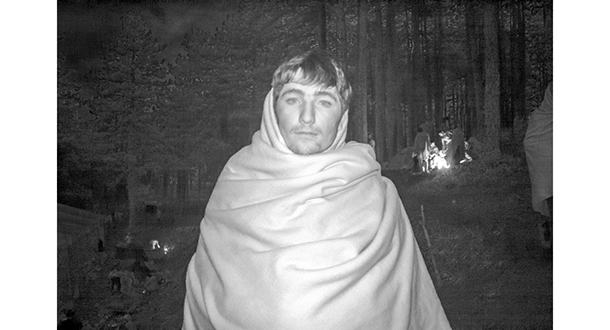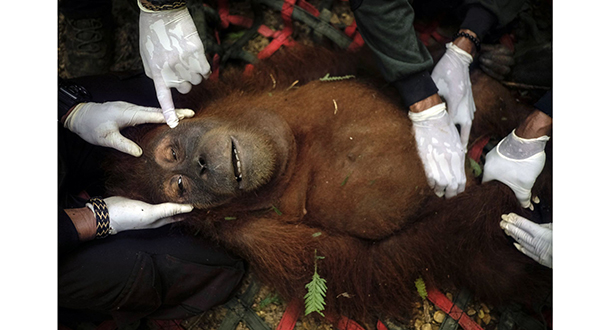
Balcanica
Ottobre 12, 2019
Claudia Amatruda
Ottobre 17, 2019Near Bangun Sari village in the Aceh province of North Sumatra Indonesia. Once on level ground, veterinarian Jeni, assisted by the team, proceeds with a thorough medical check measuring the animal’s vital statistics and noting all visible markings. Here, they discover that she is blinded in one eye and has an old bullet wound on one leg. Near Bangun Sari village in the Aceh province of North Sumatra Indonesia, a small plantation owner has called in HOCRU, the Human Orangutan Conflict Response Unit (a division of the Orangutan Information Centre - OIC), to rescue an orangutan from a rubber plantation. It is not the first time. As the rainforest continues to be depleted and fragmented by palm oil and rubber plantations, logging, road construction and other development, orangutans are forced out of their natural habitats in search of food. After hours of tracking through thick brush, the team is able to sedate the animal and perform a medical check. Although this 15-year-old female, who the team names Lynda, is blind in one eye and displays several other wounds from previous encounters with humans, her vitals are good and (vet) Jeni, determines that she is fit to be returned to the Tenggulun protected forest, a two-hour drive (shortcut through a palm oil plantation) from here. Contact with humans is inevitable and dangerous. Today, with just over 14,000 specimens left, the Sumatran orangutan (Pongo abelii) of the Leuser Ecosystem, is listed as Critically Endangered by the International Union for Conservation of Nature (IUCN). General caption ; Indonesia’s Sumatran orangutan is under severe threat from the incessant and ongoing depletion and fragmentation of the rainforest. As palm oil and rubber plantations, logging, road construction, mining, hunting and other development continue to proliferate, orangutans are being forced out of their natural rainforest habitat. Organizations like the OIC (Orangutan Information Center) and their immediate response
Salvare gli oranghi di Alain Schroeder
Vincitore del concorso Wildlife & Nature 2019
Questa serie documenta il comportamento incongruo tra l’uomo e l’ambiente a Sumatra, in Indonesia. Da un lato l’uomo distrugge le foreste vergini, ferendo e uccidendo animali, mentre dall’altro lato fa tutto il possibile per salvarli. Un giorno, un orangotango viene trovato accecato da 74 ferite da proiettili ad aria compressa, e il giorno dopo un chirurgo viaggia a metà del pianeta per salvarlo.
L’orangotango di Sumatra in Indonesia è gravemente minacciato dall’incessante e continuo impoverimento e frammentazione della foresta pluviale. Mentre le piantagioni di palma da olio e gomma, il taglio di legname, la costruzione di strade, l’estrazione mineraria, la caccia e altri sviluppi continuano a proliferare, gli oranghi sono costretti a lasciare il loro habitat naturale della foresta pluviale.
Organizzazioni come l’OIC (Orangutan Information Center) e il loro team di risposta immediata HOCRU (Human Orangutan Conflict Response Unit), soccorre gli oranghi in difficoltà (persi, feriti, prigionieri…) mentre il SOCP (Sumatran Orangutan Conservation Programme) si occupa della riabilitazione e della risocializzazione degli oranghi nella loro struttura medica appositamente costruita per reintrodurli in natura e per creare nuove popolazioni autosufficienti e geneticamente vitali nelle foreste protette.
Che condividiamo il 97% del nostro patrimonio genetico con gli oranghi sembra ovvio quando si osserva il loro comportamento simile agli umani. Oggi, con poco più di 14’000 esemplari rimasti, l’orangotango di Sumatra (Pongo Abelii) e gli 800 esemplari della specie di Tapanuli (Pongo tapanuliensis), recentemente scoperta, sono elencati dall’Unione Internazionale per la Conservazione della Natura (IUCN).
Esposizione fotografica composta da 12 fotografie a colori.
Apertura: controllare gli orari
Data / Ora
12/10/2019 - 27/10/2019
10:00 - 18:30
Luogo
Ex Macello
Categorie

